|
The Bishop as First Minister of the Sacraments of Initiation Here is another excerpt from the Ceremonial of Bishops, numbers 404 and 1182: The
bishop is the chief steward of the mysteries of God and the overseer of
all liturgical life in the Church entrusted to his care. He therefore
regulates the conferral of baptism, which brings with it a share in
Christ's royal priesthood; and he is the primary minister of
confirmation. The bishop also has responsibility for the entire process
of Christian initiation, a responsibility he carries out personally or
through the presbyters, deacons, and catechists of his diocese. Ecclesiastical
tradition has viewed pastoral responsibility in this regard to be so
peculiarly the bishop's own as to declare without qualification, in the
words of St. Ignatius of Antioch: "It is not permitted to baptize
without the authorization of the bishop." There
is special reason for the bishop to be involved in the Christian
initiation of adults and to celebrate its principal steps. He should
exercise his ministry in the sacraments of initiation for both adults
and children at the solemn celebration of the Easter Vigil and, as far
as possible, during pastoral visitations.
It is recommended that
during the pastoral visitation the bishop confer not only the sacrament
of confirmation but other sacraments as well, particularly in his visits
to the sick. In this way he will more clearly appear to the faithful as
the chief steward of the mysteries of God and as the overseer and
guardian of the entire liturgical life in the Church entrusted to his
care.
Reception into Full Catholic Communion (from the National Statutes for the Catechumenate, nos. 30-35, passim) Those
who have been already been baptized in another Church or ecclesial
community should not be treated as catechumens or so designated. Their
doctrinal and spiritual preparation for reception into full Catholic
communion should be determined according to the individual case, that
is, it should depend on the extent to which the baptized person has led a
Christian life within a community of faith and been appropriately
catechized to deepen his or her inner adherence to the Church. Those
baptized persons who have lived as Christians and need only instruction
in the Catholic tradition and a degree of probation within the Catholic
community should not be asked to undergo a full program parallel to the
catechumenate. The reception
of candidates into the communion of the Catholic Church should
ordinarily take place at the Sunday Eucharist of the parish community,
in such a way that it is understood that they are indeed Christian
believers who have already shared the sacramental life of the Church and
are now welcomed into the Catholic eucharistic community upon their
profession of faith and confirmation, if they have not been confirmed,
before receiving the Eucharist. The
"Rite of Reception into the Full Communion of the Catholic Church"
respects the traditional sequence of confirmation before Eucharist.
Rite of Christian Initation of Adults (nos. 473-486) This
is the liturgical rite by which a person born and baptized in a
separated ecclesial community is received, according to the Latin Rite,
in the full communion of the Catholic Church. The rite is so arranged
that no greater burden than necessary (see Acts 15:28) is required for the establishment of communion and unity. (In
the case of Eastern Christians who enter into the fullness of Catholic
communion, no liturgical rite is required, but simply a profession of
Catholic faith, even if such persons are permitted, in virtue of
recourse to the Apostolic See [Rome], to transfer to the Latin Rite.) The rite should
appear clearly as a celebration of the Church and have as its high
point Eucharistic communion. For this reason the rite should normally
take place during Mass.
Reception into Full Communion with Confirmation (the candidate:) I believe and profess all that the holy Catholic Church believes, teaches, and proclaims to be revealed by God. (the
bishop:) Jacalyn, the Lord receives you into the Catholic Church. His
loving kindness has led you here, so that in the unity of the Holy
Spirit you may have full communion with us in the faith that you have
professed in the presence of his family. My
dear candidate for confirmation, by your baptism you have been born
again in Christ and you have become a member of Christ and of his
priestly people. Now you are to share in the outpouring of the
Holy Spirit among us, the Spirit sent by the Lord upon his apostles at
Pentecost and given by them and their successors to the baptized. The
promised strength of the Holy Spirit, which you are to receive, will
make you more like Christ and help you to be a witness to his suffering,
death, and resurrection. It will strengthen you to be an active member
of the Church and to build up the Body of Christ in faith and love. .
. . All-powerful God, Father of our Lord Jesus Christ, by water
and the Holy Spirit, you freed your sons and daughters from sin and gave
them new life. Send your Holy Spirit upon her, to be her helper and
guide. Give her the spirit of wisdom and understanding, the spirit of
right judgment and courage, the spirit of knowledge and reverence.
Fill her with the spirit of wonder and awe in your presence. We
ask this through Christ our Lord. (all:) Amen. (the bishop:) Jacalyn, be sealed with the gift of the Holy Spirit. (newly confirmed:) Amen.
|



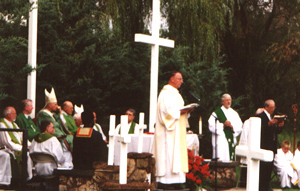
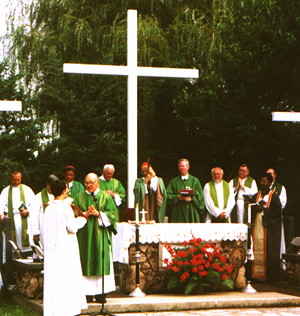
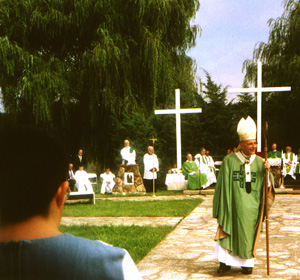
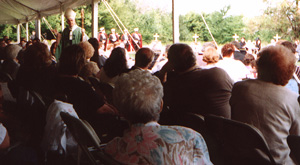
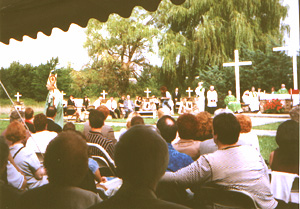
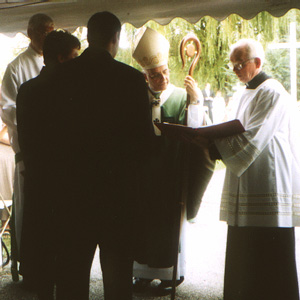
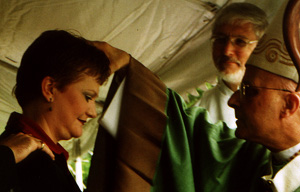
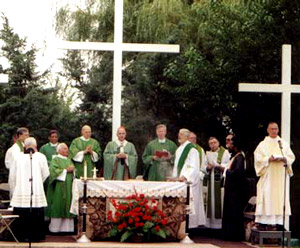
 top
top